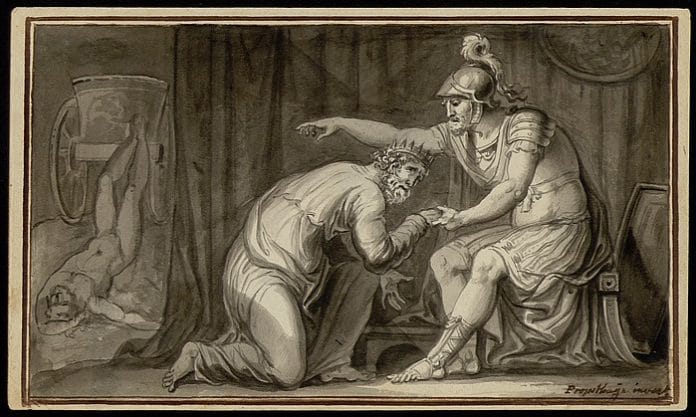As Supreme Court decriminalises homosexuality, here’s a look at nine queer characters that fought society’s norms.
New Delhi: The Supreme Court decriminalised homosexuality in a landmark judgment Thursday as it upheld that “denial of self-expression is inviting death”. In view of the legal breakthrough, here’s a look at nine remarkable queer characters in literature.
Achilles from Homer’s Iliad
Homer’s Greek epic Iliad painted an Achilles very different from the one that the Hollywood movie Troy (2004) portrays. There is no ‘Briseis’ involved with Achilles. Rather, Achilles’ lover is his cousin — Patroclus. It is his death that prompts Achilles to return to the Trojan War, despite Agamemnon’s offensive remarks that prompted him to abandon the war in the first place. Madeline Miller in 2011 made this romance the central theme of The Song of Achilles.
Also read: Perhaps, homosexuals have cured Baba Ramdev
Dorian Gray from a Picture of Dorian Gray by Oscar Wilde
Oscar Wilde was imprisoned and sentenced to two years of hard labour for ‘homosexuality’. One of his most famous characters, Dorian Gray, too faces subtle attacks for being bisexual. Dorian and Basil Hallward’s relationship is known to be sexual, with Hallward always making overtures towards his muse. The book was first published in 1890.
Nick Carraway from The Great Gatsby by Scott F. Fitzgerald
Nick Carraway is not only Daisy Buchanan’s cousin and a foil to Jay Gatsby, he is also the narrator of a romance that took the world by storm in the 1920s. Written at the peak of prohibition, Carraway’s implied homoerotic statements have had many wonder till date where exactly his sexuality falls on the spectrum. He, however, never outrightly declares it so.
Clarissa from Mrs. Dalloway by Virginia Woolf
Clarrisa’s remembrances of her childhood friend Sally Seton are doused with homoerotic subtext. Considered a repressed homosexual by many critics, Clarissa has no option but to give into the patriarchal practices of England in the 1920s. “…’if it were now to die ‘twere now to be most happy” — to die in bed was one of the most common euphemisms for an orgasm. It is telling that Clarissa says this in memory of her time with Sally.
Begum Jan from Lihaaf by Ismat Chughtai
Begum Jan marries Nawab Sahib only to find out that her husband prefers men. Now as Sahib spends his evenings dallying with young boy, Begum Jan feels her desires consume her. In an evocative short story, that has problems of its own, Chughtai creates a female character that can voice her sexual needs and explore her sexuality. The lihaaf, a blanket, promises protection.
Joan Gilling from The Bell Jar by Sylvia Plath
Joan Gilling, the athletic female, is protagonist Esther Greenwood’s high school friend and her companion in the mental asylum. Joan is defiant. She refuses to be cowed down, and is capable of making sexual advances towards her friend. If one goes by Plath’s book, US was not a happy place for lesbians in the 1960s. Gilling inevitably commits suicide, unable to the cope with the world.
Lorde in Zami: A new spelling of my name by Audre Lorde
Poet Audre Lorde’s autobiography, Zami is an exploration of the space that she occupies with the community of black feminists as a lesbian. Audrey’s entire narrative refers to her partner, the one who helped her realise her own identity is something that she need not be ashamed of. “Women can die in agony who have lived with blank and beautiful faces. I can afford to look at myself directly, risk the pain of experiencing who I am not, and learn to savor the sweetness of who I am,” she evocatively concludes.
Lucy Lurie from Disgrace by J.M. Coetzee’s
Lucy’s story is a heart wrenching tale. Daughter of the protagonist, David Lurie, she chooses to live in Cape Town instead of living with her partner Helen. They are separated. She is raped. There are many conjectures as to why this happens — she is a white woman living in a post-Apartheid South Africa. Another is that she is a lesbian, one who doesn’t shy away from openly declaring her sexual choices.
Also read: I set my alarm at 5:30 am in UK to hear Section 377 verdict: Ritu Dalmia
Dumbledore from the Harry Potter series by J.K. Rowling
No list of gay characters can be complete without mentioning the epic Albus Dumbledore and Gillert Grindlewald romance. Although the relationship’s potential has not yet been explored, Dumbledore’s overwhelming wisdom and need to be morally right coupled with Grindlewald’s dark side makes for an explosive couple.







The illustrative image used is not that of Achilles and his cousin Patroculus. It is that of Achilles and Priam, the king of Troy and the father of Hector. In the background is the body of Hector tied to Achilles’ chariot. Priam came to the Achaean camp at night to beg Achilles to release Hector’s body so that he could be given a fitting cremation. Moreover, Partoculus had already been killed in action by now.